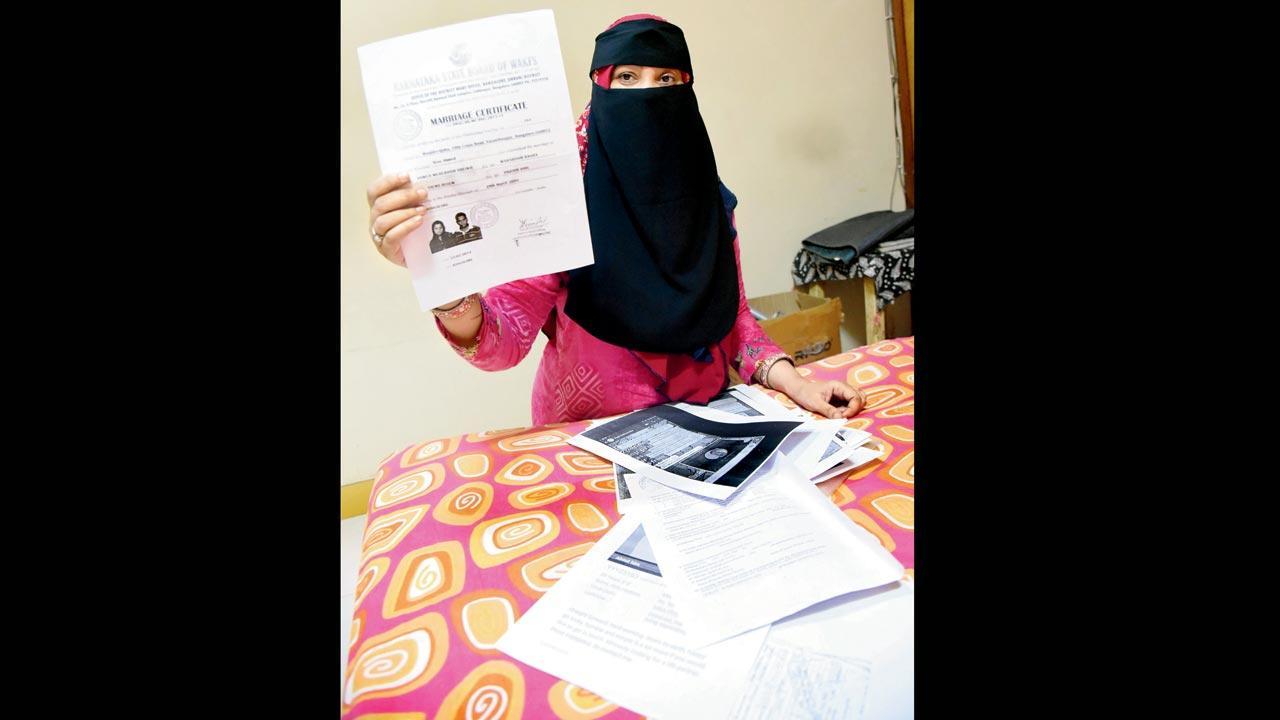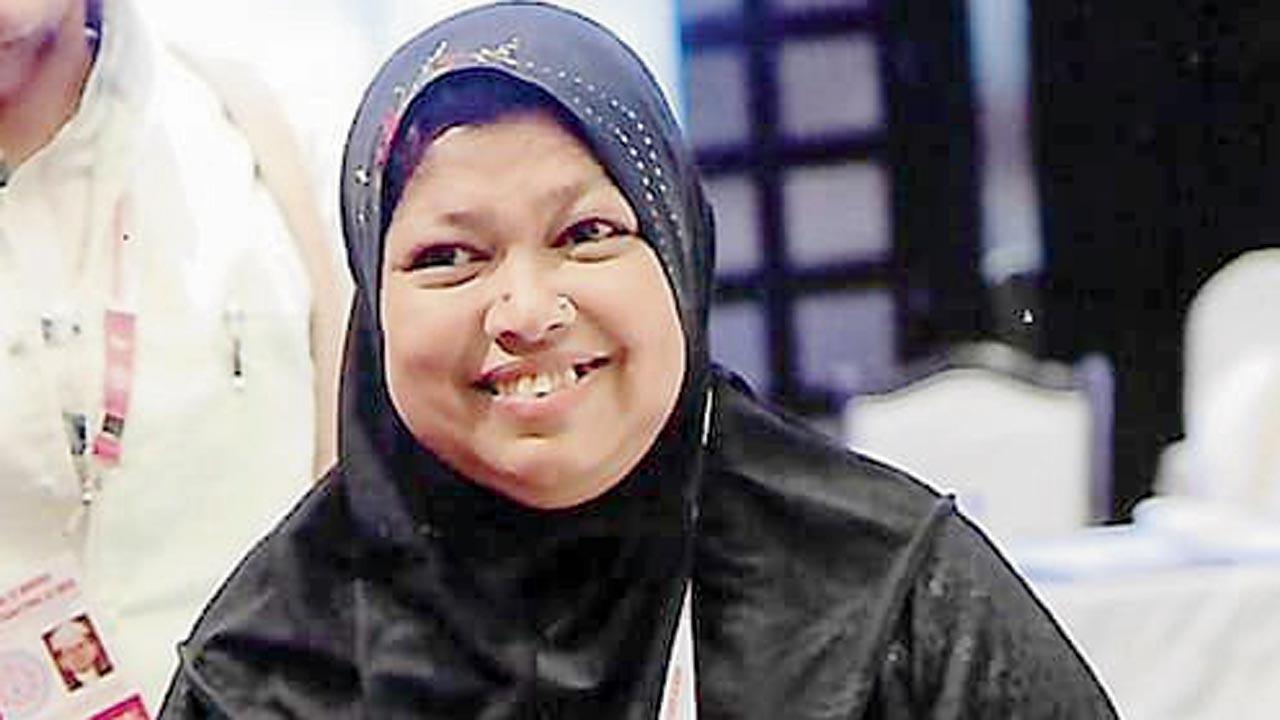Nothing has changed. After criminalisation of Triple Talaq, Muslim men bend other Sharia laws to get flash divorces

Mumbai resident Zarina Siddiqui says she has gone through a lot in her marriage which took place in 2013. Her husband, she claims, has given her divorce without following due legal and Islamic procedure. She now awaits law to take its course. Pic/Sameer Markande
Zarina Siddiqui says she has been through hell ever since her wedding day in August 2013. Her husband has allegedly married multiple times since, and woven a web of lies to cover them. There has been mental and physical assault, and extortion of money. After which, came letters of divorce.
ADVERTISEMENT
But Siddiqui won’t let him get away. She says her husband left out elements essential to the divorce process under Islamic law—witnesses and a mediation process. So, they are still married. But there are others like Siddiqui, left bewildered and distraught by a one-sided divorce.
Benazir Heena recently approached the Supreme Court saying she was divorced by her husband through Talaq-e-Hasan, but the due process was not followed. The 34-year-old challenged the constitutionality of the divorce, citing its discriminatory nature towards women.
 Maulana Saif Abbas
Maulana Saif Abbas
The case brought the spotlight back on the manipulation of the Islamic method of divorce by men looking for a quick release. “Several women have approached me with cases of Muslim men bending the laws to divorce wives, at their whim and fancy,” says Shaista Ambar, President of the All India Muslim Women Personal Law Board. Ambar’s petition in the apex court was instrumental in the abolishment and criminalisation of Triple Talaq in 2019.
She now plans to knock on the Supreme Court’s door again to stop this “unilateral way of divorcing”. “Our petition will demand a Muslim Marriage Act as per the Constitution, much the same as the Hindu Marriage Act. It [petition] will be filed in a couple of days; the draft is already ready,” she says.
Islam sanctions a few kinds of divorce: The Talaq-e-Rij’i, which gives the couple room to reconcile until the irrevocable Talaq-e-Ba’in is pronounced. Then there is the swift and painful Talaq-ul-Biddat, which apart from being un-Islamic, was struck out by the Supreme Court in 2017. A law passed in 2019 made it a criminal offence, with jail term of three years for a Muslim man who commits the act. Using Talaq-ul-Biddat, men could divorce spouses simply by repeating the word “Talaq” three times consecutively in person, over email, text or phone, with or without witnesses.
 Shaista Ambar
Shaista Ambar
Talaq-e-Rij’i can be pronounced in two ways: Through Talaq-e-Hasan, where “Talaq” is proclaimed by the husband three times over a course of three months or three menstrual cycles of the wife. In Talaq-e-Ehsan, ‘Talaq’ is said three times in one sitting, but the divorce is complete only after iddah—three menstrual cycles. A window is left open for reconciliation (sulah), and hope is pinned on intimacy to mend relations.
“A divorce becomes irrevocable when it is pronounced for the third time, after the husband and wife are given enough time to reconcile between the two pronouncements,” explains Maulana Saif Abbas, Shahi Imam of the mosque at Lucknow’s Chhota Imambara.
Then there is Khula, initiated by the wife where she is ready to forego her mehr—the monetary sustenance or gift given to her by the husband at the time of nikaah.
None of these methods of divorce are valid if undertaken in a state of intoxication, as a joke without the actual intent, when the woman is menstruating or
is pregnant, without mediation efforts and without the presence of two sane witnesses. Witnesses are even more important than the presence of the husband or wife, who can be represented by agents or guardians in special cases. It is also unlawful for the man to expel his wife from the house she resides in at the time of divorce.
Both clauses were overlooked in Siddiqui’s case. On October 10, 2019, her husband sent her a letter stating this was the first proclamation of divorce (as per Talaq-e-Rij’i). “He also accused me of having relations with another man,” says the 42-year-old. “The second letter came in November 2019, followed by a fatwa [a legal Sharia ruling] in January 2020 from a mufti at Lucknow’s Darul Uloom Nadwatul Ulama, saying I was divorced. All this while, I kept trying to reach out to him, but failed.”
Maulana Abbas says that when he oversees divorce cases, the number of which has increased considerably lately, he ensures both sides are involved in the process. “Indian law does not permit for unilateral divorce by the husband and so, we ask for the woman and her family to be duly notified and informed,” he says.
“I got married in 2013, and went to Chennai with my husband,” Siddiqui says. It was the second marriage for both. “My father even helped us financially to set up a home. I was soon pregnant, and my husband and in-laws sent me to live with my parents in Mumbra to ease the financial strain. Our son was born in April 2014, but they did not allow me to return to Chennai.”
Only in 2017, when their son was three years old, did Siddiqui’s husband turn up to meet him, she says. “While I was pregnant, I found out that he was not divorced from his first wife. When confronted, he said he couldn’t end that marriage as she had cervical cancer, and he was her sole caregiver.” Siddiqui soon went to Chennai with her son, only to be told to live in a hotel.
All this while, her family kept giving money to the in-laws to tide over financial difficulties. “I tried to make my marriage work,” she says. Then Siddiqui heard that her husband was looking for a third wife on matrimonial sites. A wedding was fixed with a woman in Lucknow, where he used to travel for business. She followed him there. He put me up in a house without power supply,” she says, “and I lived there with two children [one from her previous marriage]. I was thrown out by the landlord when he stopped paying rent.” By involving some relatives from Lucknow, she was able to stall the third marriage.
This is when, she says, the physical abuse started. “He beat me up so badly that I nearly died,” she says. “In 2019, he tried to divorce me using Triple Talaq, which I rejected since it is unlawful in both, Islam and by law.” In August that year, Siddiqui moved back in with her parents. Then came the two divorce pronouncements by mail and the fatwa.
Siddiqui says she approached the Lucknow police to lodge an FIR against her husband, but they didn’t take cognisance. The Mumbai police took six months to lodge an FIR against him and his parents under the applicable sections of the Indian Penal Code, and the Muslim Women (Protection of Rights on Marriage) Act, 2019. It was finally lodged in February 2020. The case is in court while Siddiqui lives off her elderly parents.
“Since Triple Talaq has been criminalised,” says Ambar, “they [Muslim men] are finding other ways [to shrug off responsibility]. There are no witnesses and they are washing their hands off any maintenance which they are obliged to provide the wife.”
Maulana Abbas agrees. He says the correct method of divorce gives ample time for reconciliation. “Divorce is irrevocable when given twice. When a husband pronounces it once, the couple can reach an understanding at any time. Pronounced the second time, it is still revocable, and the couple can live as spouses without any formalities. However, if the couple is unable to live together, and divorce is pronounced the third time, it is final. The due process has to be followed which looks more towards reconciliation.” Above all, he adds, “Two witnesses have to be present when the divorce is given, even if the husband or wife is absent. That cannot
be omitted.”
Meanwhile, Siddiqui awaits lawful action. “These divorces are painting Islam in bad light globally. The religion has laid down rules, but its followers are manipulative. The law must help me now.”
 Subscribe today by clicking the link and stay updated with the latest news!" Click here!
Subscribe today by clicking the link and stay updated with the latest news!" Click here!







